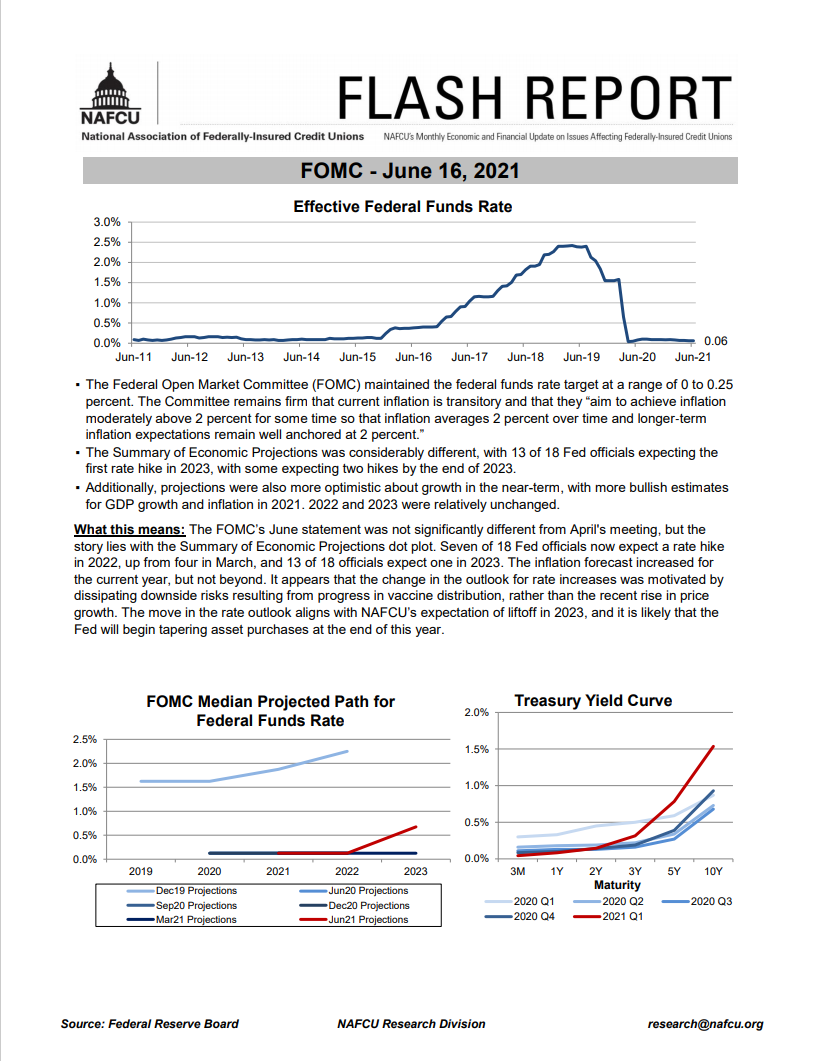Newsroom
The Fed remains firm inflation is transitory
The Federal Open Market Committee (FOMC) maintained the federal funds rate target at a range of 0 to 0.25 percent.  The Committee remains firm that current inflation is transitory and that they “aim to achieve inflation moderately above 2 percent for some time so that inflation averages 2 percent over time and longer‑term inflation expectations remain well anchored at 2 percent.”
The Committee remains firm that current inflation is transitory and that they “aim to achieve inflation moderately above 2 percent for some time so that inflation averages 2 percent over time and longer‑term inflation expectations remain well anchored at 2 percent.”
“As expected, the Fed moved forward its expected date for liftoff to 2023, and more than one-third of the committee believes it will occur in 2022," said NAFCU Chief Economist and Vice President of Research Curt Long in a new Macro Data Flash report. “The inflation forecast increased for the current year, but not beyond.”
“It appears that the change in the outlook for rate increases was motivated by dissipating downside risks resulting from progress in vaccine distribution, rather than the recent rise in price growth,” added Long.
Of note, the Summary of Economic Projections was considerably different, with 13 of 18 Fed officials expecting the first rate hike in 2023, with some expecting two hikes by the end of 2023.
Additionally, projections were also more optimistic about growth in the near-term, with more bullish estimates for GDP growth and inflation in 2021, 2022 and 2023 were relatively unchanged.
“The move in the rate outlook aligns with NAFCU’s expectation of liftoff in 2023, and it is likely that the Fed will begin tapering asset purchases at the end of this year.” Long concluded.
More insights from the meeting can be found in the new Macro Data Flash report. The FOMC is expected to meet next July 27-28.
Share This
Related Resources
Add to Calendar 2024-06-26 14:00:00 2024-06-26 14:00:00 Gallagher Executive Compensation and Benefits Survey About the Webinar The webinar will share trends in executive pay increases, annual bonuses, and nonqualified benefit plans. Learn how to use the data charts as well as make this data actionable in order to improve your retention strategy. You’ll hear directly from the survey project manager on how to maximize the data points to gain a competitive edge in the market. Key findings on: Total compensation by asset size Nonqualified benefit plans Bonus targets and metrics Prerequisites Demographics Board expenses Watch On-Demand Web NAFCU digital@nafcu.org America/New_York public
Gallagher Executive Compensation and Benefits Survey
preferred partner
Gallagher
Webinar
Add to Calendar 2024-06-21 09:00:00 2024-06-21 09:00:00 2024 Mid-Year Fraud Review Listen On: Key Takeaways: [01:16] Check fraud continues to be rampant across the country. Card fraud is affecting everyone. [04:31] Counterfeit US passport cards are just another new toolbox in the bad actors’ toolbox. [07:21] Blocking the fallback is the only way to defeat counterfeit cards. [11:17] The best way is constant education to your members in as many channels as you can. [13:02] We are still seeing overdraft lawsuits. Make sure the programming you have at your credit union matches what you have displayed for the members. Web NAFCU digital@nafcu.org America/New_York public
2024 Mid-Year Fraud Review
Strategy & Growth, Consumer Lending
preferred partner
Allied Solutions
Podcast
Add to Calendar 2024-06-21 09:00:00 2024-06-21 09:00:00 The Evolving Role of the CISO in Credit Unions Listen On: Key Takeaways: [01:30] Being able to properly implement risk management decisions, especially in the cyber age we live in, is incredibly important so CISOs have a lot of challenges here. [02:27] Having a leader who can really communicate cyber risks and understand how ready that institution is to deal with cyber events is incredibly important. [05:36] We need to be talking about risk openly. We need to be documenting and really understanding what remediating risk looks like and how you do that strategically. [16:38] Governance, risk, compliance, and adherence to regulatory controls are all being looked at much more closely. You are also seeing other technology that is coming into the fold directly responsible for helping CISOs navigate those waters. [18:28] The reaction from the governing bodies is directly related to the needs of the position. They’re trying to help make sure that we are positioned in a way that gets us the most possibility of success, maturing our postures and protecting the institutions. Web NAFCU digital@nafcu.org America/New_York public
The Evolving Role of the CISO in Credit Unions
preferred partner
DefenseStorm
Podcast
Get daily updates.
Subscribe to NAFCU today.
